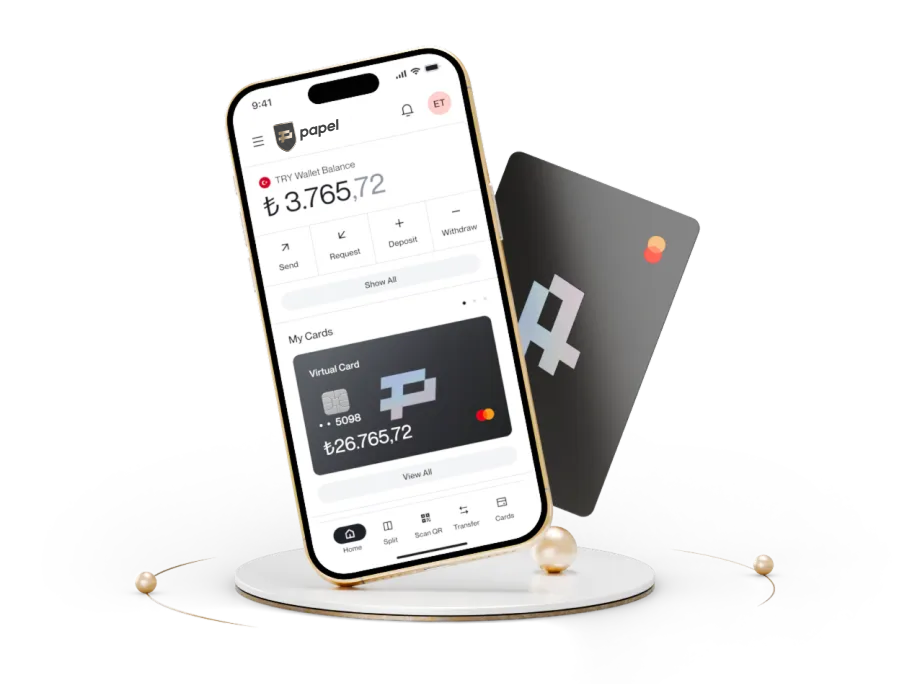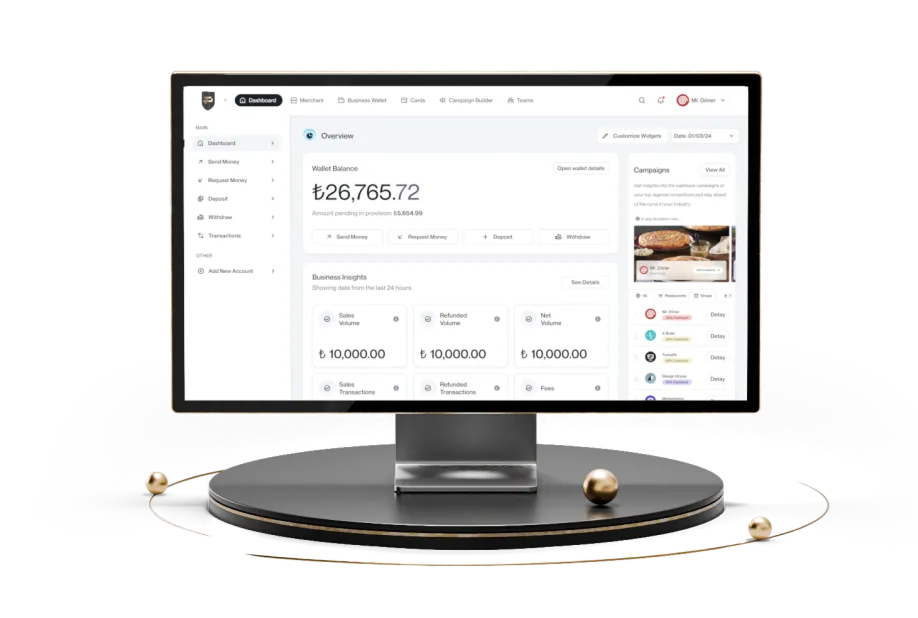What Are Digital Wallets and Electronic Money, and How Are They Used?
In today's increasingly digital world, the concept of money is also undergoing a fundamental transformation. Money, which entered human life centuries ago and became the central element of the economy, is evolving in a new direction with rapidly developing technologies in the 21st century. After experiencing many different forms, such as valuable stones, metals, and banknotes, money is now preparing to take place in the future finance and economy universe with electronic money and digital wallets.
This article answers questions about digital wallets, electronic money, and the differences between electronic and virtual money.
What is a Digital Wallet?
Digital wallets can be thought of as the virtual version of physical wallets. With digital wallets, card information can be stored in a virtual environment, bills can be paid, daily expenses can be managed, and budget can be easily managed through a single application.
In addition to basic features such as fast money transfers and bill payments, digital wallets allow users to earn cash back on purchases, buy and send gift cards, and make donations.
How to Open and Use a Digital Wallet?
Having a digital wallet is effortless. If we were to list the steps one by one:
- Choosing a Digital Wallet
- Membership Procedures
- Identity Verification
Choosing a Digital Wallet
First, you need to choose the digital wallet you want to use. For this, it can be helpful to review different financial institutions' mobile applications and websites. You can compare their advantages and disadvantages and evaluate the campaigns and opportunities from your perspective. Additionally, knowing in advance what fees or commissions the wallets charge for which transactions will prevent unpleasant surprises in the future.
Membership Procedures
To create a digital wallet, you must be a customer of a financial institution providing this service. To do so, you can start the process by clicking the "Sign Up" button on the institution's online channels.
During sign-up, you will be asked for personal information and contact details. It is essential to enter these correctly and completely. Otherwise, you may have difficulty creating an account or performing transactions.
Identity Verification
To prevent the financing of terrorism and money laundering, financial institutions are required to carry out identity verification (KYC) for their customers. After opening your account, you must follow the instructions provided by your financial institution to complete multi-step verification processes such as email verification, identity verification, and address verification. Once completed, you can start using your digital wallet with higher limits.

Advantages and Disadvantages of Digital Wallets
The advantages of using a digital wallet can be listed as follows:
- High Security
- Ease of Use
- Financial Management
- Environmentally Friendly
- Time Savings
High Security
Card information is encrypted and protected in digital wallets. Additionally, extra security measures, such as SMS OTP or biometric verification, enhance security in payments and other transactions. Thus, card information is stored in a more secure environment than a physical wallet.
Ease of Use
Using a digital wallet reduces the need for physical cards and allows for quick transactions in seconds. Contactless payment methods such as NFC and QR code scanning make the payment experience much faster and easier.
Financial Management
Using a digital wallet makes controlling income and expenses and managing your budget more manageable. If the digital wallet application also has an open banking license, users can manage different bank accounts through a single application. This way, you can control all your money through one app and adjust your spending according to your budget.
Environmentally Friendly
Digital wallets offer a more environmentally friendly alternative by reducing physical cards and minimizing the use of paper bills and receipts.
Time Savings
Depositing money into digital wallets, withdrawing money from the wallet, and conducting transfer and payment transactions are much faster. This allows you to save time on all transactions.
The possible disadvantages of using a digital wallet can be listed as follows:
- Internet Requirement
- Device Dependency
- Cyber Threats
- Risk of Mistakes
Internet Requirement
A secure internet connection is required to use a digital wallet. This is a disadvantage since transactions can only be performed with a digital wallet in an area with an internet connection. In terms of personal data security, we recommend using mobile or personal internet networks instead of public areas.
Device Dependency
An e-wallet can only be used on smart devices with an internet connection, such as phones, tablets, or computers. Therefore, the device containing the wallet must be with you at the time of payment. This can be considered a disadvantage.
Cyber Threats
Like every product operating in the digital environment, digital wallets can face threats such as identity theft, phishing, or other cyber-attack methods. Both financial institutions and users need to take some precautions to prevent this.
Risk of Mistakes
The transaction speed in digital wallets is relatively high. Therefore, care should be taken to enter the correct information when sending money or making payments. In case of a mistaken transaction, the financial institution's support team should be contacted immediately, and the situation should be reported.
What is Electronic Money?
Electronic money is a payment instrument that can be stored in a digital environment and used in place of cash for expenditures. When digital wallet users deposit their cash into their digital wallets that cash is converted into an electronic money balance and used for payments. Different currencies can be stored as electronic money in wallets.
How to Use Electronic Money?
To use electronic money, you need a digital wallet or bank account to store the balance. After opening an account, you need to load the balance into it. Then, by creating a prepaid virtual card, you can perform many transactions with your electronic money balance.
Areas of Use for Electronic Money
The electronic money balance stored in the wallet can be used for payment transactions through the digital wallet application. Additionally, this balance can be transferred to other wallet users and used for various purposes, such as splitting expenses, mobile payments, and online shopping.
Differences Between Electronic Money and Virtual Money
Electronic money refers to the digital equivalent of a legal currency. This means digitally holding currencies such as the Turkish Lira (TL), US Dollar (USD), or Euro (EUR). Virtual money, on the other hand, is a general term for currencies that are created and used digitally without being controlled by any central authority. Examples include cryptocurrencies and virtual currencies found in some digital applications or games. In summary, the difference between electronic money and virtual money can be explained this way.
Frequently Asked Questions
Is a digital wallet paid?
The standard in the digital wallet industry is to offer the wallet for free. However, some services provided within wallet services (such as bill payments, currency transactions, etc.) may incur a fixed transaction fee or a commission based on the transaction amount.
What is an e-wallet?
An e-wallet is a digital product that stores money and allows for many financial transactions, such as spending, payments, and money transfers. It may include services such as fast money transfers, bill payments, expense splitting, and earning cashback (cashback).
Where is electronic money used?
In addition to money transfers, electronic money balances can be used to shop at online and physical businesses with the necessary infrastructure. Depending on the features of the wallet application used, electronic money can also be used in many other areas, such as bill payments and expense splitting.
What is Papel Elektronik Para ve Ödeme Hizmetleri AŞ?
Papel Elektronik Para ve Ödeme Hizmetleri is an electronic money and payment services company authorized by the Central Bank of the Republic of Turkey (TCMB). In addition to digital wallet services, it offers next-generation infrastructures such as virtual POS, which allows businesses to receive payments.

